Fall 2016 Newsletter
Quick Content Links
- President’s Message
- Attention! NC Chapter of the American Fisheries Society Meeting
- Treasury Report, Fall 2016
- NCAFS Awards Committee – 2016 Student Travel Awards Presented
- News from DWR’s Wadeable Stream Fish Community Monitoring Program
- NCAFS Spotlights
- NC State University Student Fisheries Subunit Report
- Go FishPack! Three awards at AFS Meeting in Kansas City
- Update on the Little Tennessee River Snorkeling Project
- New River Snorkeling Project – Thank you NCAFS!
- Call to Action!
- Valuable Links
President’s Message
Dear Colleagues,
Fall is once again upon us and the changing seasons have many in the aquatic community looking forward to wrapping up field work and moving on to other pursuits. I have noticed a common thread in my conversations with students and colleagues that the field season is too long and they amazingly are looking forward to its completion and spending time behind a desk. As someone who increasingly finds himself trapped behind a desk I was a bit shocked to learn this. Of course, it is the essence of human nature to perceive the grass as much greener on the other side of the fence. As I sit here typing away on an unseasonably balmy mid-October afternoon in the mountains it is hard to imagine that the cold weather is coming and that pretty soon it will be time to put away the dive and electrofishing gear, enter our data and start writing up reports. Until it gets here I will be hoping for just one more warm day in the field.
President-Elect Corey Oakley has decided on a venue and a date for the annual chapter meeting in the historic riverfront town of New Bern, North Carolina from the 14th through the 16th of February. The meeting will be held, appropriately enough, in the New Bern Riverfront Convention Center. Our continuing education workshop series will this year feature a freshwater mussel identification class taught by Tim Savidge from Three Oaks Engineering and assisted by Tyler Black and Rachael Hoch from NCWRC. We are also hoping to meet jointly with the North Carolina Freshwater Mollusk Work Group.
Please see Corey’s note about the annual meeting in this newsletter and stay tuned for emails from the program committee about the Mollusk Group meeting, the workshop and information about accommodations in and travel to New Bern. Finally, speaking of the program committee, if you are interested in volunteering your time to help organize or implement the meeting please let president-elect Corey Oakley or myself know.
Well it is hard to believe that my time as the NCAFS president is nearly complete and I will only have one more opportunity to share my thoughts on these newsletter blurbs. It has been an interesting experience and one that has certainly made me less fearful of professional service. I encourage all of my colleagues, especially those who are just starting on their professional journey, to get involved with NCAFS and other professional societies. Taking on this service has been a rewarding experience and I hope to have the opportunity to keep serving this society for many years to come.
Submitted by Michael Gangloff, NCAFS President
Attention! NC Chapter of the American Fisheries Society Meeting
Join us for the
2017 Meeting of the NC Chapter of the American Fisheries Society
February 14–16, 2017

Historic New Bern
At
New Bern Riverfront Convention Center
Accommodations provided by Bridge Pointe Hotel
Events include:
Feb. 14: Oyster Roast/Social
Feb. 15: Mussel Identification Workshop/Presentations
Feb. 16: Presentations/Business Meeting
MORE DETAILS SOON!
Submitted by Corey Oakley, NCAFS President-Elect
Treasury Report, Fall 2016
Continuing our good fortunes, the financial health of the Chapter remains strong. Balances of the Chapter’s financial accounts as of September 30, 2016 are:
- Robust Redhorse Conservation Committee –$8,725.02;
- NCAFS checking –$5,218.86;
- NCAFS PayPal –$192.99;
- NCAFS Edward D. Jones Account 1 (Ichthus Fund) – $30,559.32;
- NCAFS Edward D. Jones Account 2 –$41,099.86.
There has been minimal financial activity during the past quarter. The EXCOM approved an $800 donation (withdrawn from the checking account) to the Friends of High Country State Parks for the purchase of snorkel equipment for the New River State Park (see write-up on page 15 for more information).
As a reminder to existing NCAFS members and those who are reading this newsletter, but who are not AFS or NCAFS members, the annual dues for both societies will expire on December 31, 2016. You may pay your 2017 state chapter dues directly to AFS when you renew your 2017 AFS membership or you can send the $7.00 membership fee directly to the NCAFS Chapter using PayPal, check, or cash. If you use PayPal, please bear in mind that NCAFS receives only $6.50 of the $7.00 dues, PayPal keeps the other 50¢ as a handling fee. As of September 2016, our Chapter membership stands at 139 of which 89 members are also AFS members. If you are not a member of either AFS or NCAFS, please consider joining one or both of the societies. For $7.00 you can’t even purchase a 6-pack of a regular brand of beer much less a microbrew! Think about it. I hope you will consider membership in AFS and NCAFS in 2017.
Submitted by Bryn H. Tracy, NCAFS Secretary/Treasurer
NCAFS Awards Committee – 2016 Student Travel Awards Presented
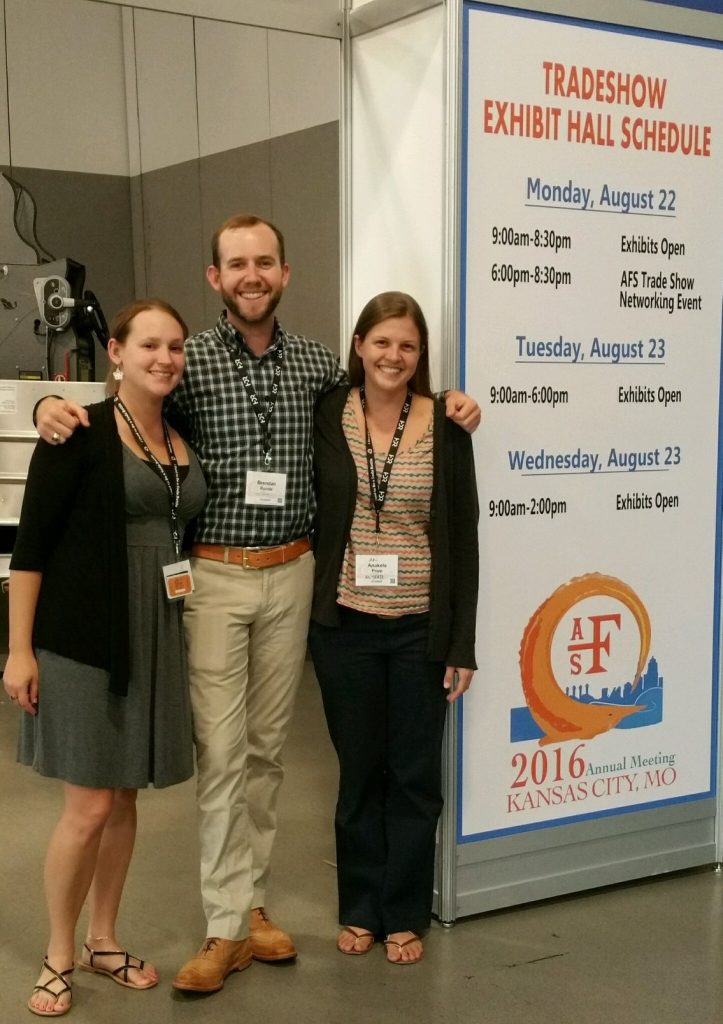
2016 NCAFS winners (L-R), Tiffany Penland, Brendan Runde, & Anakela Popp, at AFS Kansas City. Photo: Tom Kwak.
The Chapter established a Student Travel Award Program in 2005 for the specific purpose of encouraging professional growth of students and maximal participation of undergraduate and graduate students at the annual AFS meeting. Monetary support is provided to qualifying students via a travel award of $200 to $400 to help defer the cost of meeting travel, registration, and accommodations. The 2016 awards were presented to three students for the 146th Annual Meeting of AFS held August 21-25 in Kansas City, Missouri.
The 2016 award recipients were Tiffany Penland, Anakela Popp, and Brendan Runde, all graduate students from NC State University. They each received a cash award of $400 from the Chapter’s Ichthus Fund account, which was established specifically to foster student involvement.
They each represented the Chapter admirably at the meeting and expressed their sincere gratitude to NCAFS for helping to make their attendance and participation possible.
Submitted by Greg Cope and John Crutchfield, NCAFS Awards Committee
News from DWR’s Wadeable Stream Fish Community Monitoring Program
Basinwide Assessments
In 2015, 73 sites were sampled as part of the Broad and Neuse River basinwide monitoring program using the North Carolina Index of Biotic Integrity protocols. In the Broad, 17 of the 26 sites were rated Good or Excellent with the remaining 9 sites rated as Good-Fair. Sites rated as Excellent, included Brier Creek, nominated for Outstanding Resource Waters in 2011; North Fork First Broad River, re-classified as Outstanding Resources Waters in 2007; and Walnut Creek, nominated for High Quality Waters in 2007. The most widely distributed species encountered include Bluehead Chub (also the most commonly collected species), Piedmont Shiner, Striped Jumprock, and Redbreast Sunfish. Saffron Shiner and Mottled Sculpin were encountered only at one site, Big Hungry Creek, but they were extremely abundant at that site.
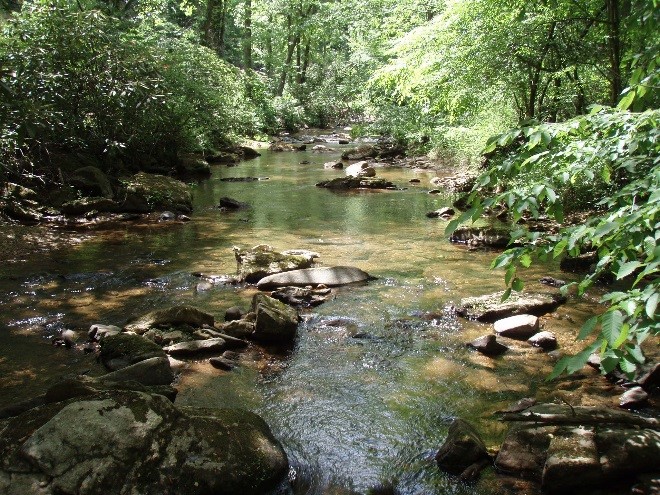 Brier Creek, Rutherford County, rated Excellent in 1998, 2005, 2010, & 2015. |
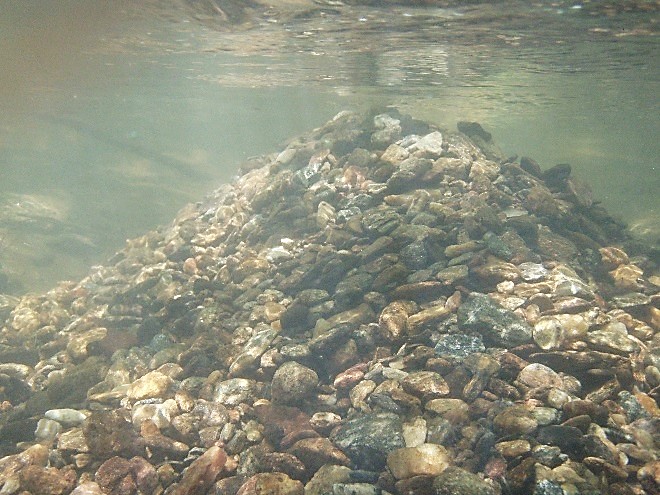 Large Bluehead Chub nest constructed in Brier Creek. |
In the urbanized Piedmont portion of the Neuse River Basin, there are still fish communities such as those in Horse Creek (Wake County) and South Fork Little River (Durham County) which continue to rate Excellent, but there is a greater number of streams, in contrast to the number in the more rural Broad River Basin, that rate as Good-Fair, Fair, or Poor. Fish communities in Swift and Walnut creeks in Wake County and Ellerbee Creek in Durham County definitely need some attention and remediation.
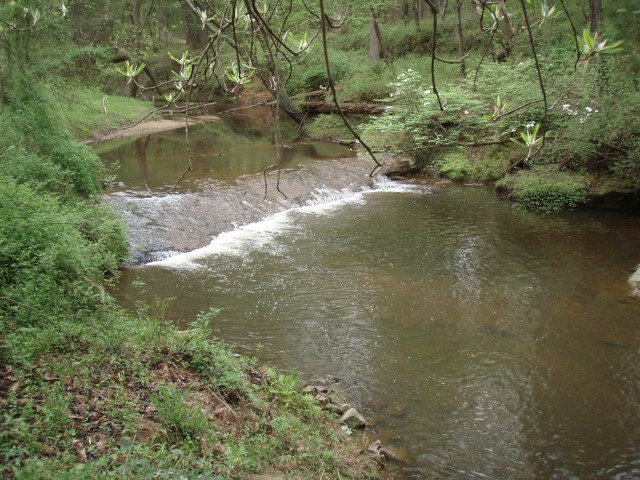 Horse Creek, Wake County which has been rated Excellent in 2015. |
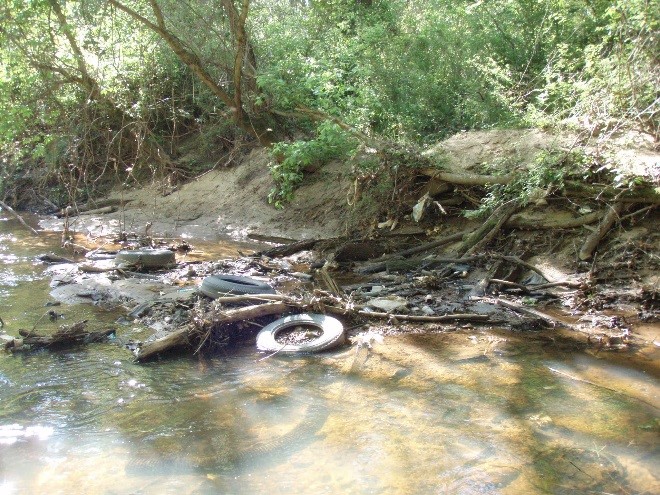 Walnut Creek, Wake County, which rated Fair in 2010 and 2015. |
Coastal Plain Metric Development
Fish community data from wadeable Coastal Plain streams have been collected by staff since 1990 following standard operating procedures. However, metrics and biocriteria were never developed specifically for these unique communities inhabiting channelized and natural channel streams; the fish communities were not rated accurately (i.e., bioclassifications were too low for streams with no or minimal anthropogenic impacts) after applying the existing metrics and biocriteria for Piedmont streams; and consequently, the Coastal Plain fish communities were classified as Not Rated.
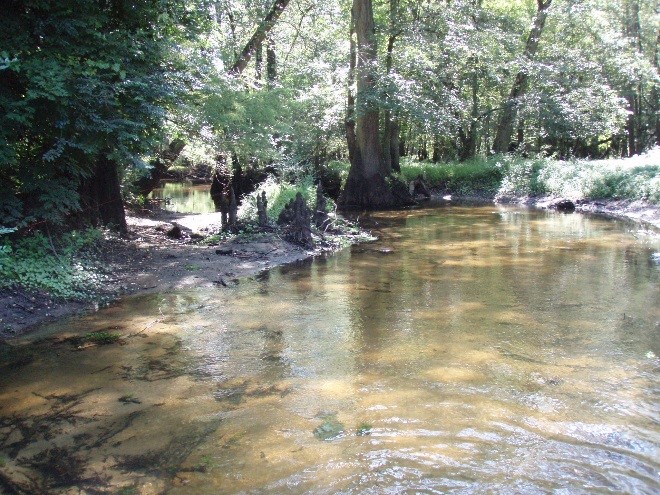 Falling Creek, Lenoir County, a natural channel Coastal Plain stream. |
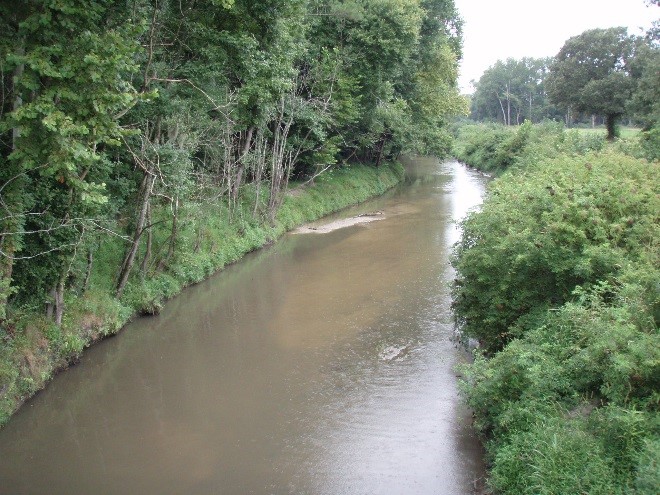 Swift Creek, Pitt County, a channelized Coastal Plain stream. |
Over the past many years, analytical methods were developed to derive reference sites – the first step in developing metrics and criteria for rating fish communities in Coastal Plain streams. Since 2000, watershed-derived characteristics have been used to select reference sites in other basins. Such methods, based upon systematically-gathered data, are preferable to subjective methods based upon expert opinion or best professional judgment. Reference sites were selected based on six criteria (Table 1).
Table 1. Reference site selection hierarchy — a watershed-based approach for streams.
- Total habitat score ≥ 65;
- No NPDES permitted wastewater dischargers greater than 0.01 MGD above the site or if there are small wastewater dischargers (~≤ 0.01 MGD), the dischargers are more than one mile upstream;
- Percentage of the watershed Developed1 (which includes open space, lawns, low-high intensity development, and golf courses and is a surrogate for imperviousness cover) < 15%;
- Percentage of the watershed Forested1 (which includes deciduous, evergreen, mixed, dwarf scrub, shrub/scrub, and wetlands) ≥ 50%;
- Percentage of the watershed Cultivated1 (which includes pasture/hay and cultivated crops) ≤ 35%; and
- Width and integrity of the riparian zone (no breaks in the riparian zones or, if there are breaks, the breaks are rare) ≥ 18m.
1Landuse categories were based upon the 1991, 2001, 2006, and 2011 NLCD codes for Forest (41, 42, 43, 52, 90, 91, and 95), for Developed (21, 22, 23, and 24), for Cultivation (82 and 81), for Barren Rock (31), and for Grassland/Herbaceous (71) and were calculated with USGS’s StreamStats software (http://water.usgs.gov/osw/streamstats/north_carolina.html).
The process of reference site selection for Coastal Plain streams began with 193 samples collected between 1991 and 2015 from 111 unique sites. From this list, 158 samples were eliminated from consideration as reference samples ultimately yielding 38 samples from 27 sites that qualified as reference sites and 158 samples from 92 sites that qualified as non-reference sites. The number of reference sites/samples from each basin were: Cape Fear (7 sites, 9 samples), Lumber (2 sites, 2 samples), Neuse (7 sites, 15 samples), Tar (8 sites, 9 samples), and White Oak (3 sites, 3 samples). Now that reference sites have been chosen, the second part of this multi-year project will be to screen the Coastal Plain-specific metrics and criteria, ultimately leading to a Coastal Plain NCIBI will be an additional biological monitoring tool that can be used by the DWR in evaluating wadeable streams in the Coastal Plain, similar to tools that were developed for North Carolina’s Sand Hills, Piedmont, and Mountain streams.
NEW DWR DISTRIBUTIONAL RECORDS FOR 2015
(i.e., those not shown in Menhinick (1991) and collected for the first time by DWR staff from a particular county in the Broad, Neuse, and French Broad River systems)
- Broad River Basin – none;
- Etheostoma flabellare, Fantail Darter, Little Creek, tributary to Swift Creek and ultimately the Neuse River, Johnston County, one specimen, 39 mm TL, first collection ever from this county, Neuse River Basin; and
- Clinostomus funduloides, Rosyside Dace, Mine Fork, tributary to Jacks Creek and ultimately the Toe River, 18 specimens, 56-69 mm TL, first collection ever from this county, non-indigenous to the French Broad River basin. Note: Dr. Dave Gillette at UNC-Asheville, also has records of this species from the upper Swannanoa River watershed in Buncombe County.
These specimens were vouchered at the North Carolina State Museum of Natural Sciences, along with other indigenous and nonindigenous species once again collected from the Broad and Neuse River basins in 2015. All data collected are shared with the North Carolina Wildlife Resources Commission, USGS (Gainesville, FL; http://nas.er.usgs.gov/taxgroup/fish/default.aspx), the North Carolina Natural Heritage Program (http://www.ncnhp.org/share-data/contribute), and the North Carolina State Museum of Natural Sciences (http://collections.naturalsciences.org/searchFishes.aspx). Additional information about the Wadeable Stream Fish Community Monitoring Program is available online (Fish Community).
Submitted by Bryn H. Tracy, NC Division of Water Resources
NCAFS Spotlights
Brendan Runde is from rural southern Maryland, a peninsula punctuated by a thriving seafood industry, large swaths of agricultural land, and signage of questionable spelling and grammar. Growing up in close proximity to the Chesapeake Bay gave him an appreciation for the flavorful culture dependent on the fruit of the sea. He followed in the footsteps of both parents and attended Virginia Tech University, where he would receive two Bachelor’s Degrees (Fisheries Science and Biology, in 2013).
It was at Virginia Tech that his passion for charismatic ichthyofauna was refined and took hold of his future. Exposure to the Virginia Tech student subunit of AFS in his freshman year introduced him to the world of a professional society rife with diversity and unrivaled social events. Runde performed undergraduate research with Dr. Andrew Rypel, where he quickly got his fill of pulling otoliths from stream fishes. After graduation, he took a job at Hollywood Oyster Company, a startup oyster grower, back home in Maryland. Days became weeks, and weeks became months, until the caked-on mud and oyster flesh became too much for him. A frustration-fueled browsing session of the Fisheries.org job board yielded fruit: a MS Assistantship with Dr. Jeff Buckel at NC State University looked like a good fit. And so it came to pass that Brendan Runde moved to the bustling metropolis of Morehead City, NC.
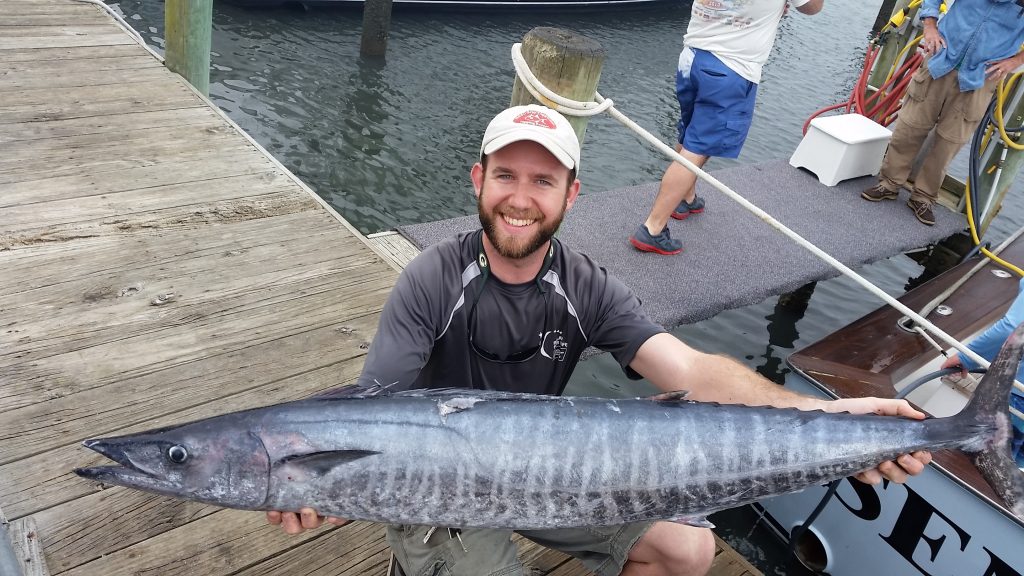
Brendan Runde with a wahoo caught off Morehead City in summer 2015.
Runde’s research is focused on estimating discard mortality of reef fishes. His primary work is a mark-recapture study of Gray Triggerfish, where his team uses SCUBA diving to tag trap-caught fish as a control group. Runde is fortunate: field work for this study frequently involves the hallowed method of sampling known as “hook-and-line”; for a marine fisheries graduate student, the lines between work and play are undeniably blurred. His study will yield a better estimate of discard mortality of Gray Triggerfish, which will prove valuable for future stock assessments. In addition to marine ecology in general, Runde’s other research interests include evaluating descender devices as a means of promoting survival in deepwater groupers and the use of spatial closures in rebuilding reef fish stocks. If the funding gods are kind to him, Runde plans to continue his never-ending education by staying on with the Buckel Lab for a Ph.D.
Runde’s non-fish-related hobbies include consuming his home-made beer, hunting waterfowl, upland game, and White-tailed Deer with his dad, and yelling at his television during Green Bay Packers games.
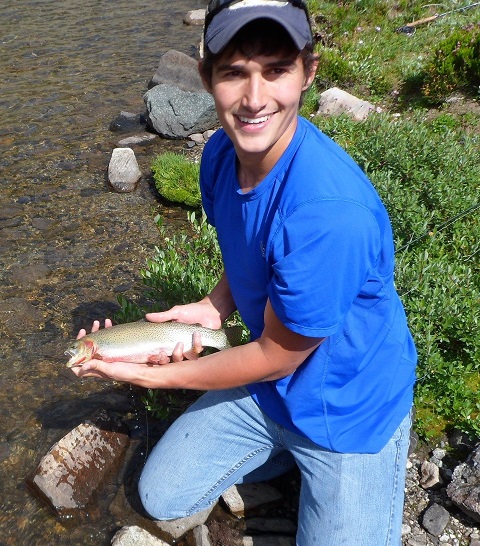
TJ with a Westslope Cutthroat Trout from southwest Montana
Thomas Johnson (“TJ”) joined the NC Wildlife Resources Commission as the new District 7 Assistant Fisheries Biologist in May 2016. He is excited to be working alongside Kin Hodges in his niche and managing the sport fisheries of the northwestern counties of the state.
Endemic to the foothills of the Blue Ridge Mountains, TJ grew up hunting and fishing in McDowell County. His interest in aquatic organisms was fostered through experiences such as snorkeling in Great Smoky Mountains National Park where he first observed charismatic microfauna such as Tangerine Darters and Whitetail Shiners. Embracing this passion, he interned with the Commission and earned a BS in Biology from Appalachian State University. Following graduation, he worked in the Smokies as a fisheries technician for the National Park Service and as a hatchery technician for the Tennessee Wildlife Resources Agency before attending Tennessee Technological University to pursue an MS in Biology. His graduate research evaluated propagation of native Brook Trout at three distinct hatcheries and the post-stocking survival of the hatchery-reared progeny.
TJ resides in Boone, NC and spends his free time mountain biking, hiking, running, snowboarding, and, of course, fishing.
NC State University Student Fisheries Subunit Report
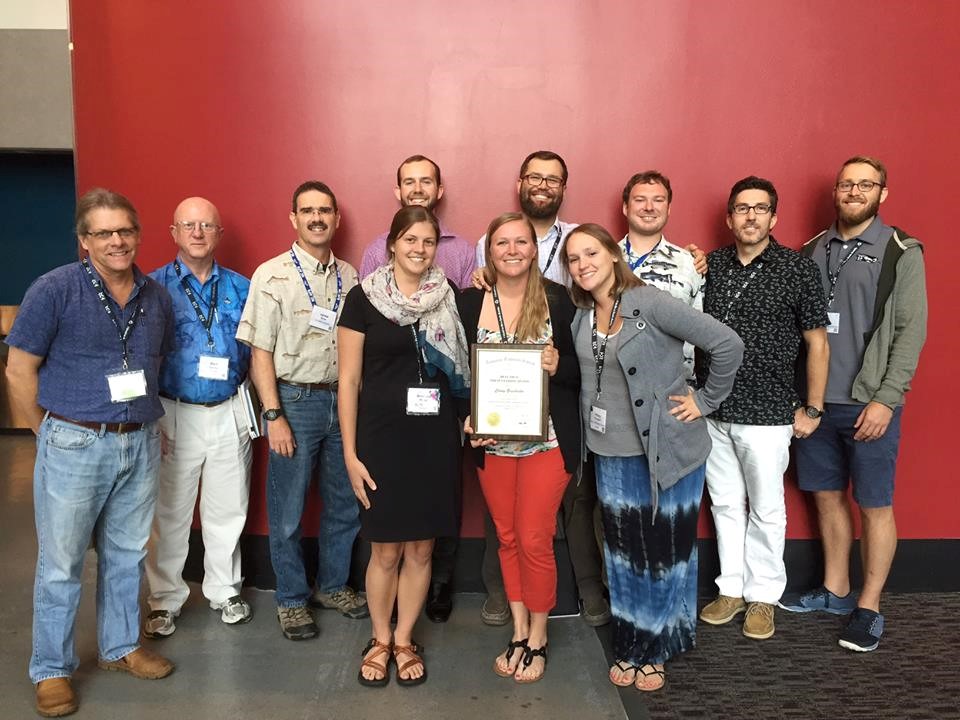
Some of the Wolfpack gathered for a photo after the AFS business meeting. From left to right. First Row: Tom Kwak, Wilson Laney, Jim Rice, Brendan Runde, Jesse Fischer, Tomas Ivasauskas, Derek Aday, Gus Engman. Second Row: Anakela Popp, Casey Grieshaber, Tiffany Penland. Photo: Tom Kwak.
As the new semester starts, students in NC State University’s (NCSU) Student Fisheries Subunit (SFS) gear up to tackle a new year of learning and outreach. After winning Southern Division American Fisheries Society Best Student Subunit in 2015, SFS has big goals for this coming school year. This year we will seek to promote the exchange of fisheries and aquatic knowledge among individuals and benefit the community surrounding our school.
To kick off the semester, several of our members attended the Annual Meeting of the American Fisheries Society in Kansas City, MO. NCSU was well represented, and in addition to giving presentations, attending talks and section meetings, and networking, our attendees managed to sneak a taste or two of KC’s famous barbecue (nope, they got nothing on NC…). Overall, the meeting was a great success, and SFS is looking forward to Tampa in 2017!
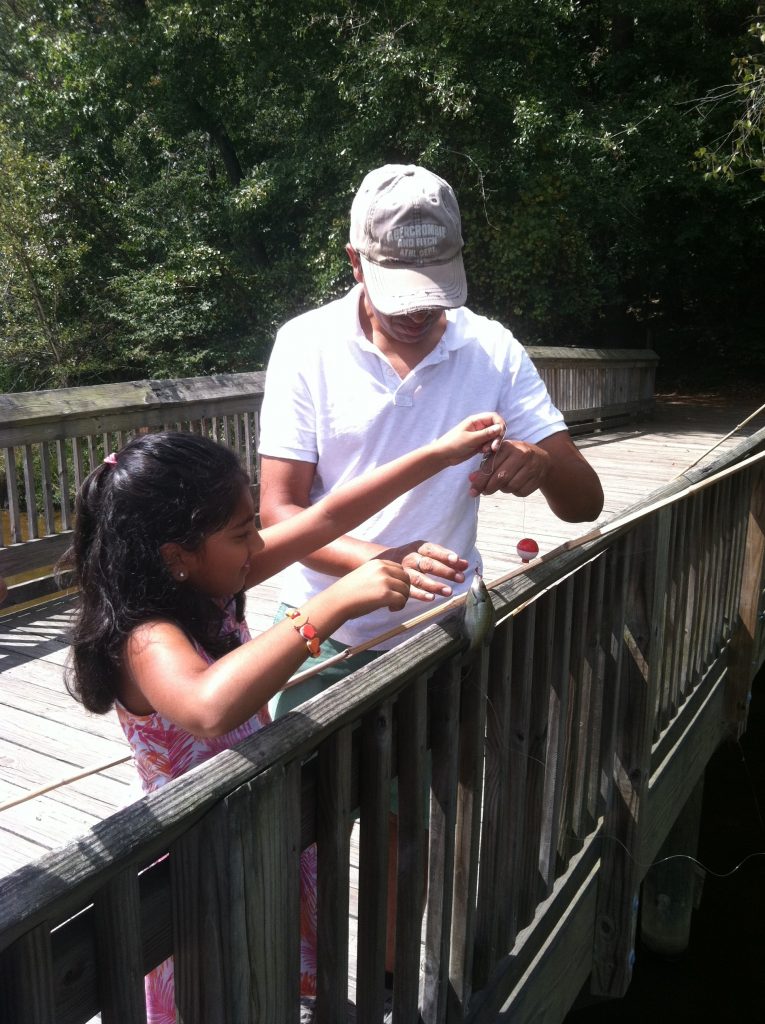
A new angler gets a little help taking her first fish off the line.
Outreach in the community is a key way we engage and promote service among members. Recently, SFS volunteered at the Harvest Festival at Historic Yates Mill Park near campus. This event featured cane pole fishing for children and families. The children enjoyed fishing off the dock and our students appreciated the chance to serve the families in our community. Many a first fish was caught! Our members also assisted with National Hunting and Fishing Day at Lake Raleigh, located in the heart of campus.
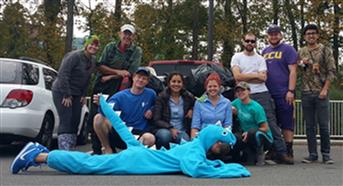
NCSU SFS members dressed up for last year’s Halloween stream clean up.
Kids and kids at heart practiced their casting abilities with the Backyard Bass game, then put their skills to the test fishing off the docks. These outreach events give our members a chance to put their communication and volunteer skills to use.
Sharing the knowledge we gained from our education is also another fundamental of SFS. This year we again participated in the Shad in the Classroom Program. Our members travelled to participating schools throughout North Carolina and taught 670 students in 24 classrooms, from kindergarten to high school, about fish ecology and physiology with a hands-on dissection. Each year our members love sharing our knowledge of fish to eager young students. Their curiosity examining and learning about the shad specimens is something none of our members want to miss. This is the third year SFS has assisted with the in-class dissections.
To give our members an opportunity to further develop education and outreach skills, this spring SFS hosted a Project WET workshop. Attendees were trained in the Project WET curriculum and learned techniques for effective teaching. To continue this training, SFS has planned an Aquatic WILD training this fall.
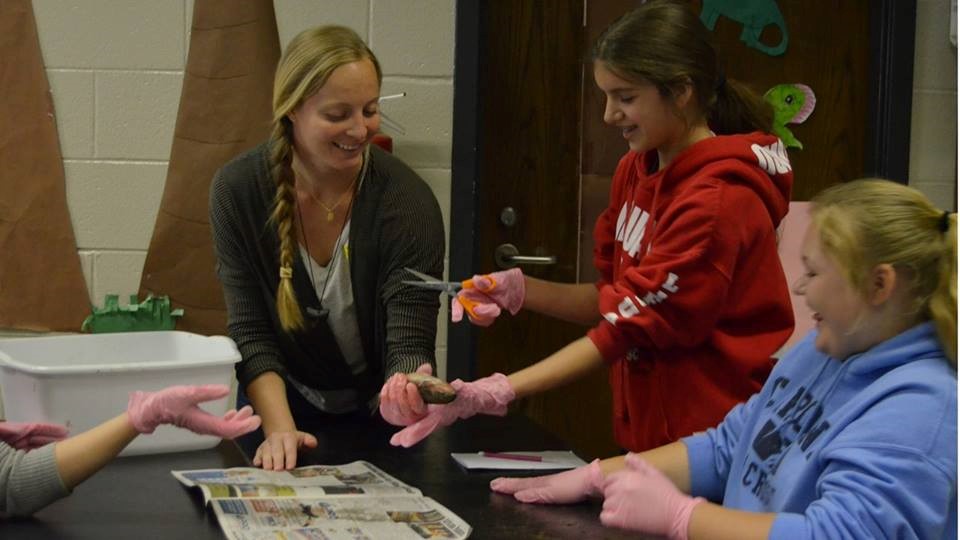
NCSU SFS member Enie Buhler helps students with a dissection.
Not only does the NCSU SFS participate in outreach and educational opportunities but we also like to have fun! This summer was the second annual Snorkelpalooza in Western NC. Members camped, snorkeled, fished, and soaked in the beauty of NC’s mountain streams. This year, we were joined by members from the North American Native Fishes Association, who were more than happy to share their knowledge and enthusiasm.
Conservation is a core aspect of our SFS. Each semester, we organize a stream clean-up for Rocky Branch Creek, which runs through the middle of NCSU’s campus. This is a fun event that allows us to get outside and clean up our city. We pull out garbage bags full of Styrofoam, tennis balls and plastic water bottles. This event helps beautify our campus and brings us together as a club.
Finally, NCSU SFS has a new website! You can now find us at https://ncsusfs.wordpress.com/. Stay tuned for more updates about meetings, outreach activities, and fishy fun! NCSU SFS is thankful for the continued support from NCAFS and professionals. We continue to seek new ways to make our club flourish. Our enthusiastic members and support from the community will continue to fuel our club’s impact on NCSU’s campus.
Submitted by Stephen Cox and Ani Popp, NCSU SFS Executive Committee Members
Go FishPack! Three awards at AFS Meeting in Kansas City
Three members of our Chapter from NC State University received prestigious awards at the AFS Parent Society Meeting in Kansas City, August 21-25.
Casey Grieshaber, Master’s student advised by Tom Kwak and Greg Cope, earned the Best Student Presentation Award at this meeting! Her winning presentation was entitled “Relation of Intersex and Fish Health to Contaminants in Riverine Fishes”.
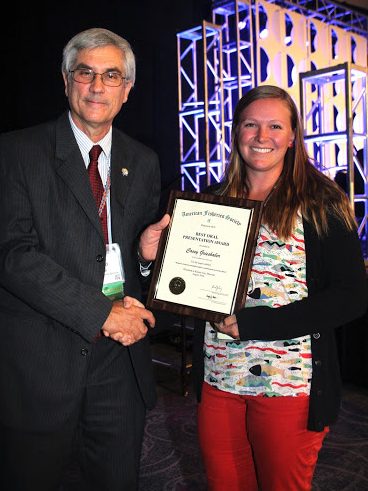
Casey receives the Best Student Presentation Award from AFS President Ron Essig at the Society Business Meeting.
Tiffany Penland, Master’s student advised by Greg Cope and Tom Kwak, received the Equal Opportunity Travel Award from the AFS Equal Opportunity Section.
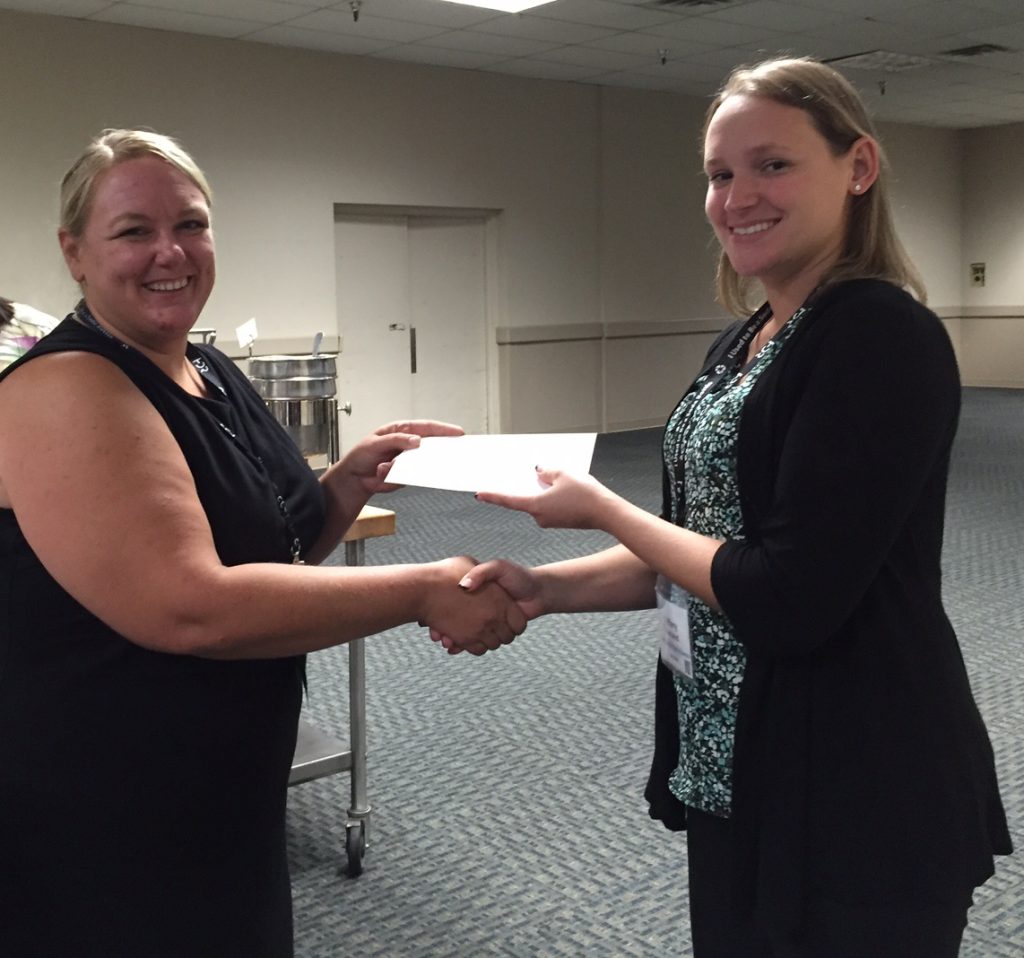
Tiffany accepts the Equal Opportunity Travel Award from Section President Marybeth Brey at the Equal Opportunity Section Luncheon.
Jesse Fischer, Assistant Professor, was the recipient of the Young Professionals Travel Award from the AFS Education Section.
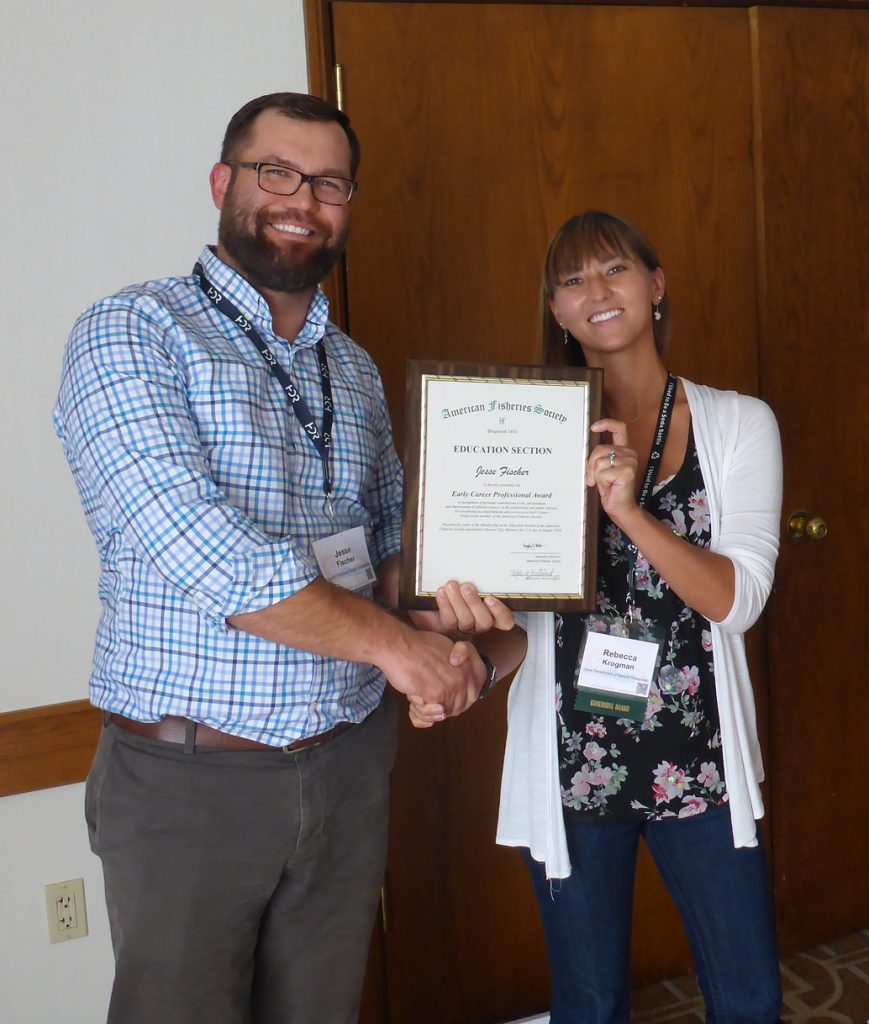
Jesse receives the Young Professionals Travel Award from Committee Chair Rebecca Krogman at the Education Section Business Meeting.
These are all very competitive national awards, that shine a bright light on NC State University and our Chapter.
Congratulations, Casey, Tiffany, and Jesse!
Submitted by Tom Kwak, NC Cooperative Fish and Wildlife Unit
Update on the Little Tennessee River Snorkeling Project
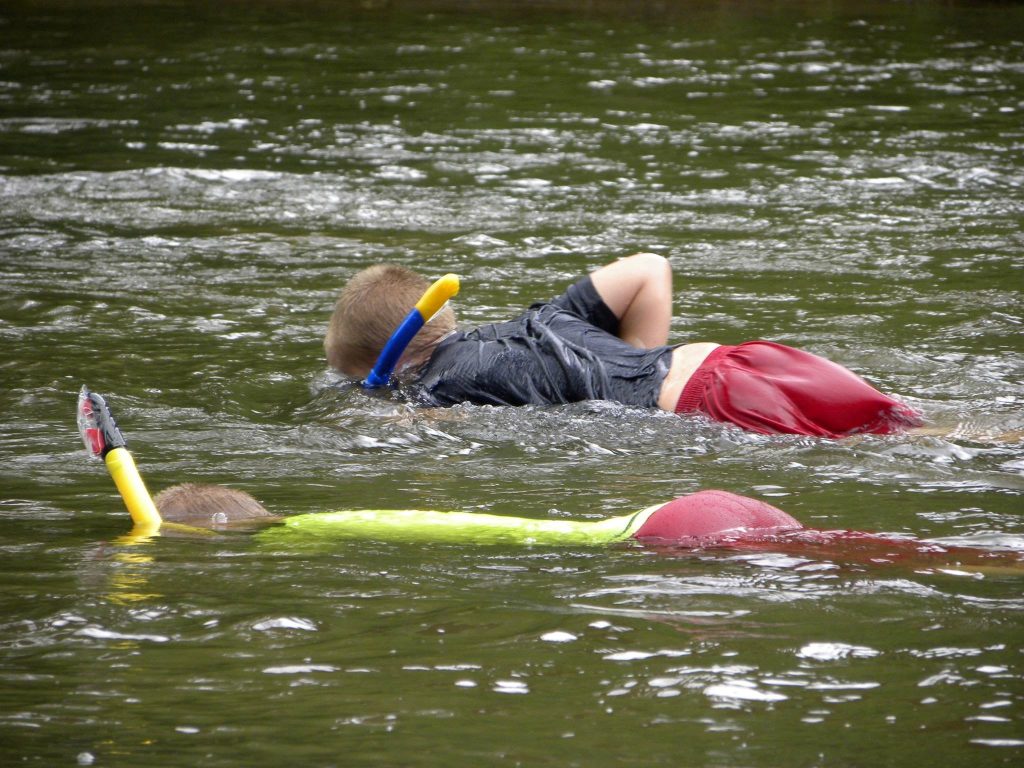
Kids explore the Little Tennessee River. Photo: Jason Meador
At the March 2016 annual business meeting, Chapter members voted to fund half ($3,218) of a funding request from the Little Tennessee Native Fish Conservation Partnership (NFCP) for the Little Tennessee River Snorkeling Project. The North Carolina Wildlife Federation donated the remaining half of the funding need, and we were able to purchase wet suits, masks, and snorkels for 15 adults and 15 children and other supplies for a Little Tennessee River basin snorkeling program.
As we purchased our gear after the summer was in full swing, our inaugural snorkeling season was a bit short. However, Little Tennessee River Native Fish Conservation partners held three educational events, educating 43 children and 19 adults.
Jason Meador, the Citizen Science Program Manager for Mainspring Conservation Trust, led two snorkeling events with Swain County 4-H summer camp students in the Little Tennessee River. The Smoky Mountain News, a well-read regional newspaper, published a photo essay on these outings (http://www.thesmokymountaintimes.com/news/4-h-goes-snorkeling). According to Jason, many of the adventurers had been to the Little Tennessee River on family fishing trips or picnics, but they had no idea of the underwater world in the river. “The kids were just happy to get in the water during the hot August day. They saw fish, crayfish, mussels, hellgrammites and other aquatic life,” Jason says. Parents were excited too; although they were only responsible for transportation to the site, they didn’t hang out on the banks and watch but headed out into the river to get wet and learn, as well.
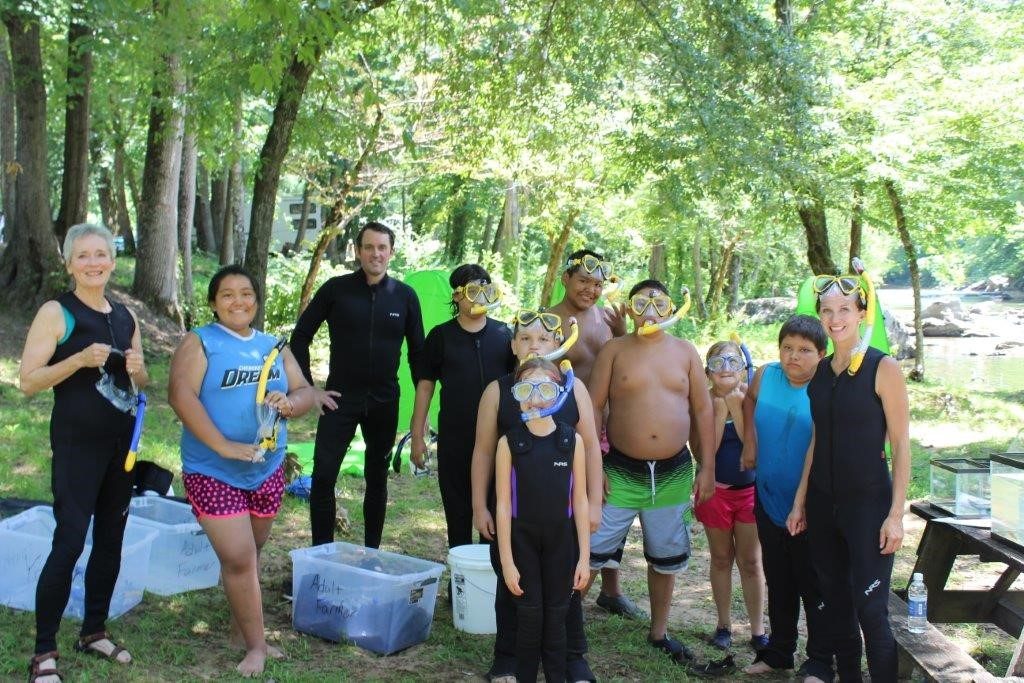
Getting geared up for the Oconaluftee River. Photo: Mike LaVoie
On the Eastern Band of Cherokee Indian (EBCI) reservation, Mike LaVoie, EBCI Fisheries and Wildlife Management Program Manager, led a snorkeling event in the Oconaluftee River with students in the Cherokee Choices Summer Program. This program is for Cherokee children at risk for diabetes; the camp’s goal is to expose the children to active and outdoor activities and Cherokee culture. The snorkeling event with the Cherokee Choices summer camp this summer was a big success and was rated by the kids as one of their top activities. “Support provided by NCAFS to purchase the snorkeling equipment will have a lasting impact on our program’s ability toteach about native fish conservation and improve community health through getting people more active in the outdoors,” says Mike.
The Little Tennessee NFCP is already planning for our 2017 field season. There is a high demand for snorkeling education in the region, and we are thankful to NCAFS and North Carolina Wildlife Federation for their support of this work.
Submitted by Andrea Leslie, Little Tennessee Native Fish Conservation Partnership
New River Snorkeling Project – Thank you NCAFS!
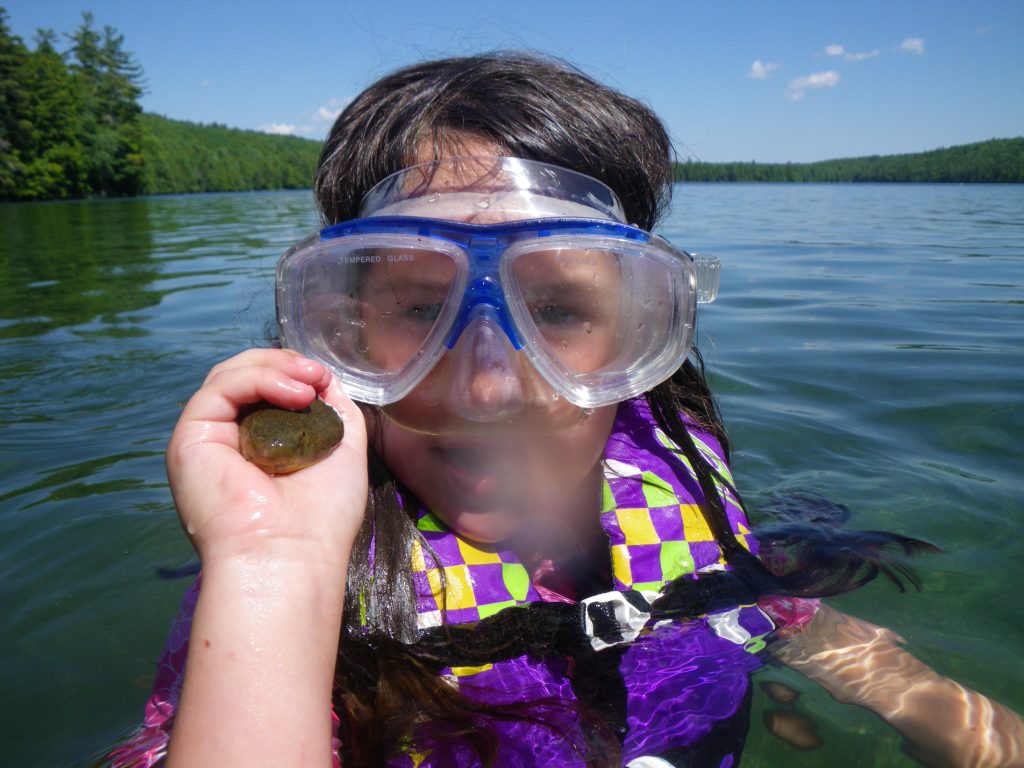
Thanks to NCAFS, newly purchased snorkel equipment will be used to re-connect adults and kids with inhabitants of the New River. Photo: Kevin Hining
On behalf of NC State Parks (NCSP) and the NC Wildlife Resources Commission (NCWRC), we would like to thank the NCAFS for their generous $800 donation towards the purchase of snorkel equipment to help provide educational experiences at New River State Park (NRSP).
NRSP is tasked with protecting a highly diverse aquatic community and providing outreach to visitors about the river and its many species. The provision of snorkel equipment, coupled with the ease of river access at NRSP, will allow visitors to experience firsthand the unique organisms below the river’s surface. Due to the rivers warmth in the summer months, adults and children will be able to utilize the equipment for several weeks each year without wetsuit materials. As a result, the funds will be used to purchase 20 masks (approx. $30 each = $600), a storage compartment and cleaning supplies ($100), and to pay for printing materials that promote the program ($100).
The program will utilize a first come first serve check out system for the snorkel equipment, much like one would check out a book at a library. In addition, the gear will allow NCSP and NCWRC staff to conduct snorkel based education events for the general public, and will also be used during routine biological surveys on the New River (i.e. Hellbender monitoring, native fish assessments).
On behalf of non-government and agency partners, we sincerely appreciate the support of NCAFS. The program will provide the general public with an exciting and educational outdoor experience, while raising public awareness to the incredible abundance and diversity of aquatic organisms in the New River. Finally, all funds were sent to the Friends of High Country State Parks, a non-profit organization that supports the New River State Park. Thank you again!
Submitted by Kevin Hining, NCWRC Northern Mountain Education Specialist
Call to Action!
If you want to contribute, have a story idea or would like us to include something in next quarter’s newsletter, email Kevin Hining [email protected] or give him a call at 336-877-1087.
Also, if you want to become more involved with one of the many great NCAFS committees then please check this link for information about each one, contacts, etc., http://nc.fisheries.org/who-we-are/committees/
 Valuable Links
Valuable Links
The American Fisheries Society Home Page offers a wealth of links to assist you in your fishy endeavors. Information on ordering AFS books, public outreach, annual meetings, chapter links and joining the AFS can be found there.
This and archived NCAFS newsletters, along with links, chapter information, and upcoming meetings, can be found on our own website.


